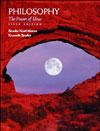| Aesthetics | The philosophical study of art and of value judgments about art and of beauty in general.
|
 |
 |
 |
| Appeals to Emotion | Flawed reasoning that tried to establish conclusions solely by attempting to arouse or play on the emotions of the audience.
|
 |
 |
 |
| Argument | A series of propositions, one of which is supposedly supported by the others.
|
 |
 |
 |
| Argument ad hominem | The mistaken idea that you can successfully challenge any view by criticizing the person whose view it is.
|
 |
 |
 |
| Begging the question | The fallacy that involves assuming as a premise the very conclusion that the argument is intended to prove.
|
 |
 |
 |
| Black-or-white fallacy | An argument that limits us to two options when in fact more options exist.
|
 |
 |
 |
| Conclusion | The proposition you are trying to establish in an argument.
|
 |
 |
 |
| Epistemology | The branch of philosophy concerned primarily with the nature and possibility of knowledge.
|
 |
 |
 |
| Ethics | The branch of philosophy that considers the nature, criteria, sources, logic, and validity of moral value judgments.
|
 |
 |
 |
| Fallacy | A commonly made mistake in reasoning.
|
 |
 |
 |
| Logic | The study of the methods, principles, and criteria of correct reasoning.
|
 |
 |
 |
| Metaphysics | The branch of philosophy that studies the nature and fundamental features of being.
|
 |
 |
 |
| Normative ethics | A system of moral value judgments together with their justifications.
|
 |
 |
 |
| Political philosophy | The philosophical study of the state, its justification, and its ethically proper organization.
|
 |
 |
 |
| Premises | In an argument, the propositions or reasoning you give for accepting the conclusion of an argument.
|
 |
 |
 |
| Red herring | The fallacy of addressing a point other than the one actually at issue.
|
 |
 |
 |
| Social philosophy | The philosophical study of society and its institutions; concerned especially with determining the features of the idea or best society.
|
 |
 |
 |
| Straw man | The fallacy of trying to refute someone's view by misrepresenting it.
|



 2002 McGraw-Hill Higher Education
2002 McGraw-Hill Higher Education

 2002 McGraw-Hill Higher Education
2002 McGraw-Hill Higher Education